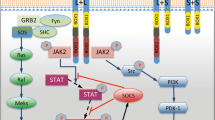Abstract
The brain tripeptide thyrotropin-releasing hormone (TRH) has been demonstrated to facilitate cholinergic neurotransmission. To test its interaction with the cholinergic system in humans, high-dose TRH (0.5 mg/kg) or placebo was administered intravenously (IV) to normal controls pretreated with scopolamine (0.5–0.75 mg IV), a centrally active muscarinic antagonist, which has been used to model aspects of the memory impairment of normal aging and of dementia. Compared to placebo, TRH markedly attenuated scopolamine-induced impairment of some measures of memory, most notably on a selective reminding task. This cognitive study is the first in humans to suggest a neuromodulatory effect of a peptide on the cholinergic system, and suggests a facilitatory role for TRH in human memory processes.
Similar content being viewed by others
References
Bartus RT (1978) Evidence for a direct cholinergic involvement in the scopolamine-induced amnesia in monkeys: evidence of concurrent administration of physostigmine and methylphenidate with scopolamine. Pharmacol Biochem Behav 9:833–836
Bassiri RM, Utiger RD (1973) Metabolism and excretion of exogenous thyrotropin releasing hormone in humans. J Clin Invest 52:1616–1619
Borowski GD, Garofano CD, Rose LI, Levy RA (1984) Blood pressure response to thyrotropin-releasing hormone in euthyroid subjects. J Clin Endocrinol Metab 58:197–200
Breese GR, Cott JM, Cooper BR, Prange AJ, Lipton MA, Plotnikoff NP (1975) Effects of thyrotropin-releasing hormone (TRH) on the actions of pentobarbital and other centrally acting drugs. J Pharmacol Exp Ther 193:11–22
Buschke H (1973) Selective reminding for analysis of memory and learning. J Verb Learn Verb Behav 12:543–550
Caine ED, Weingartner H, Ludlow DL, Cudahy EA, Wehry S (1981) Qualitative analysis of scopolamine-induced amnesia. Psychopharmacology 74:74–80
Drachman DA (1977) Memory and cognitive function in man: does the cholinergic system have a specific role? Neurology 27:783–790
Dunne MP, Hartley LR (1985) The effects of scopolamine upon verbal memory: evidence for an attentional hypothesis. Acta Psychol 58:205–217
Hasher L, Zacks RT (1979) Automatic and effortful processes in memory. J Exp Psychol [Gen] 108:356–388
Horita A, Carino MA, Lai H (1986) Pharmacology of thyrotropin-releasing hormone. Annu Rev Pharmacol Toxicol 26:311–332
Horita A, Carino MA, Lai H (1987) Preliminary studies of the effects of a TRH analog, MK-771, in an animal model of Alzheimer's disease. Proc West Pharmacol Soc 30:57–58
Jackson IMD (1982) Thyrotropin-releasing hormone. New Engl J Med 306:145–155
Kalivas PW, Horita A (1980) Thyrotropin-releasing hormone: neurogenesis of actions in the pentobarbital narcotized rat. J Pharmacol Exp Ther 212:203–210
van Kammen DP, Murphy DL (1975) Attenuation of the euphoriant and activating effects ofd- andl-amphetamine by lithium carbonate treatment. Psychopharmacologia 44:215–224
Lamour Y, Dutar P, Jobert A (1985) Effects of TRH, cyclo-(His-Pro) and (3-Me-His)TRH on identified septohippocampal neurons in the rat. Brain Res 331:343–347
Manaker S, Eichen A, Winokur A, Rhodes CH, Rainbow TC (1986) Autographic localization of thyrotropin releasing hormone receptors in human brain. Neurology 36:641–646
Mellow AM, Sunderland T, Cohen RM, Lawlor BA, Hill JL, Newhouse PA, Cohen MR, Murphy DL (1989) Acute effects of high-dose thyrotropin releasing hormone infusions in Alzheimer's disease. Psychopharmacology 98:403–407
Metcalf G (1982) Regulatory peptides as a source of new drugs: the clinical prospects for analogues of TRH which are resistant to metabolic degradation. Brain Res Rev 4:389–408
Mewaldt SP, Ghoneim MM (1979) The effects and interactions of scopolamine, physostigmine and methamphetamine on human memory. Pharmacol Biochem Behav 10:205–210
Mitsumoto H, Salgado ED, Negroski D, Hanson MR, Salanga VD, Wilber JF, Wilbourn AJ, Breur AC, Leatherman J (1986) Amyotrophic lateral sclerosis: effects of acute intravenous and chronic subcutaneous administration of thyrotropin-releasing hormone in controlled trials. Neurology 36:152–159
Overall JE, Gorham DR (1962) The Brief Psychiatric Rating Scale. Psychol Rep 10:799–812
Perry EK, Tomlinson BE, Blessed G, Bergman K, Bigson PH, Perry RH (1978) Correlation of cholinergic abnormalities with senile plaques and mental test scores in senile dementia. Br Med J 2:1457–1459
Pfeiffer E (1975) A short portable mental status questionnaire for the assessment of organic brain deficit in elderly patients. J Am Geriatr Soc 23:433–441
Safer DJ, Allen RP (1971) The central effects of scopolamine in man. Biol Psychiatry 3:347–355
Schmidt DE (1977) Effects of thyrotropin releasing hormone (TRH) on pentobarbital-induced decrease in cholinergic neuronal activity. Psychopharmacol Commun 1:469–473
Sitaram N, Weingartner H, Gillin JC (1978) Human serial learning: enhancement with arecholine and choline impairment with scopolamine. Science 201:274–276
Snyder PJ, Utiger RD (1972) Response to thyrotropin releasing hormone (TRH) in normal man. J Clin Endocrinol Metab 34:380–385
Sunderland T, Tariot PN, Weingartner H, Murphy DL, Newhouse PA, Mueller EA, Cohen RM (1986) Pharmacologic modelling of Alzheimer's disease. Prog Neuropsychopharmacol Biol Psychiatry 10:599–610
Sunderland T, Tariot PN, Cohen RM, Weingartner H, Muekker EA, Murphy DL (1987) Anticholinergic sensitivity in patients with dementia of the Alzheimer type and age-matched controls. Arch Gen Psychiatry 44:418–426
Weingartner H, Grafman J, Boutelle W, Kaye W, Martin PR (1983) Forms of memory failure. Science 221:380–382
Weingartner H, Burns D, Diebel R, LeWitt PA (1984) Cognitive impairments in Parkinson's disease: distinguishing between effort-demanding and automatic cognitive processes. Psychiatry Res 11:223–235
Winokur A, Beckman AL (1978) Effects of thyrotropin-releasing hormone, norepinephrine and acetylcholine on the activity of neurons in the hypothalamus, septum and cerebral cortex of the rat. Brain Res 150:205–209
Yamazaki N, Nagaoka N, Nagawa Y (1986) Effect of thyrotropin-releasing hormone and its analog DN-1417 on scopolamine-induced impairment of short-term memory in rats. Jpn J Psychopharmacol 6:359–366
Yarbrough GG (1979) On the neuropharmacology of thyrotropin releasing hormone (TRH). Prog Neurobiol 12:291–312
Author information
Authors and Affiliations
Rights and permissions
About this article
Cite this article
Molchan, S.E., Mellow, A.M., Lawlor, B.A. et al. TRH attenuates scopolamine-induced memory impairment in humans. Psychopharmacology 100, 84–89 (1990). https://doi.org/10.1007/BF02245795
Received:
Revised:
Issue Date:
DOI: https://doi.org/10.1007/BF02245795




